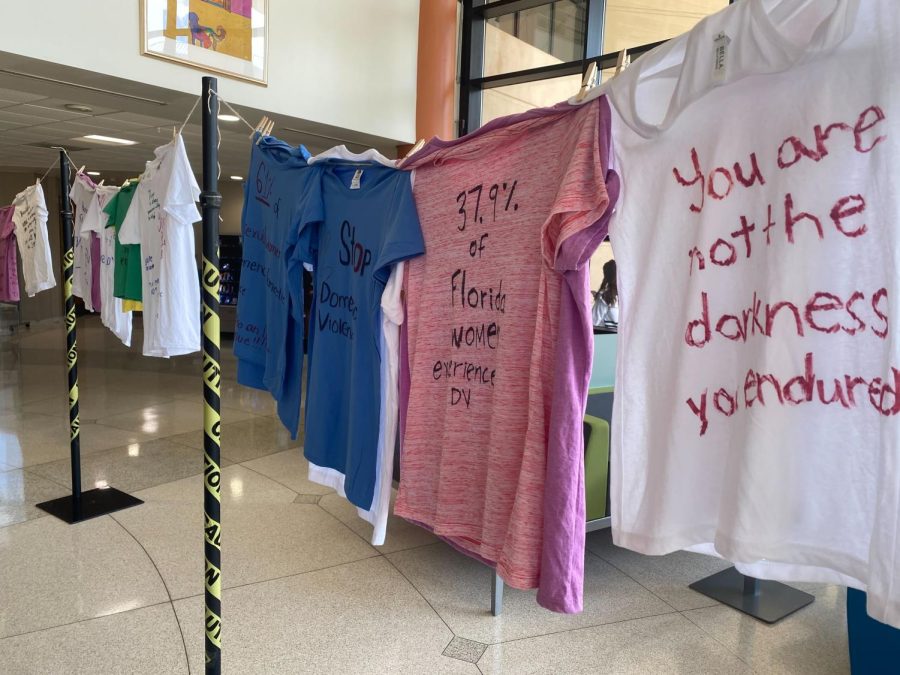Octubre rompe el silencio sobre la violencia doméstica

Espanol Versión
Octubre, es el mes de concientización sobre la violencia doméstica, donde activistas y demás organizaciones hacen un llamado para estar al tanto sobre los recursos que existen en caso de encontrarte en una situación de abuso o peligro dentro de tu hogar.
“Este mes es como un megáfono, una voz más fuerte y que realmente ayuda a la gente a saber lo que está pasando a su lado” expresó Lisa Alexander, directora ejecutiva de “Stand Up Survivor” y sobreviviente de violencia doméstica.
De acuerdo con un artículo publicado por Lifewire, los inmigrantes suelen encontrar muchas barreras al momento de hacer una denuncia y la mayoría de las veces, es por la falta de conocimiento sobre las leyes y derechos que existen para protegerse, o por su estatus migratorio.
En Orlando y Florida Central, existen diferentes entidades oficiales que pueden ayudarte a conocer cómo tratar tu caso:
- Domestic Violence Hotline: 1-800-500-1119 / TTY Hotline: 1-800-621-4202
- National Domestic Violence Hotline – 1-800-799-SAFE (7233)
- Florida Department of Children and Families, Domestic Violence Program
De igual forma, existen otras organizaciones locales en Orlando como, “Stand Up Survivor” la cual trabaja para fomentar el conocimiento sobre la violencia doméstica y enseñar cómo el abuso puede reflejarse en el hogar.
Alexander explicó los recursos y servicios que tienen para las víctimas, como lo son: consejería, asistencia y apoyo durante el proceso. Además, relata cómo la violencia doméstica puede verse al inicio con acciones tales como: controlar la forma de vestir, aislarte de tu familia y amigos, acusarte de infidelidad, o revisarte el teléfono.
“A menudo, la gente piensa que la violencia doméstica es solo física, pero es emocional, es psicológica, es abuso financiero y abuso espiritual”, dijo Alexander, además agregó que el 99% de los casos por los que a las víctimas les da miedo salir de una relación abusiva es por el aspecto financiero.
Según un estudio usado por Esperanza United, aproximadamente una de cada tres latinas, ha sufrido violencia por su pareja durante su vida y esta tasa es casi la misma que la de las mujeres de otros grupos raciales/étnicos. “Stand Up Survivor” tiene el programa “Levántate Sobreviviente” que está dedicado a personas de habla hispana que se ven afectados y que muchas de las veces son inmigrantes.
Alexander invita a la comunidad a hacer voluntariados en diferentes agencias, ayudar a alguien que lo necesite o informarse sobre este tema durante este mes para crear conciencia y alzar la voz.
English Version
October is Domestic Violence Awareness Month, and this month activists and organizations are inviting you to acknowledge the resources that exist in case you find yourself in an abusive or dangerous situation in your home.
“This month is like a megaphone, a louder voice that really helps people know what’s going on next to them,” said Lisa Alexander, executive director of Stand Up Survivor and a survivor of domestic violence.
According to an article published by Lifewire, immigrants often encounter many barriers when reporting and most of the time it is due to the lack of knowledge about the laws and rights that exist to protect themselves, or because of their immigration status.
In Orlando and Central Florida different official entities can help you learn how to deal with your case:
- Domestic Violence Hotline: 1-800-500-1119 / TTY Hotline: 1-800-621-4202
- National Domestic Violence Hotline – 1-800-799-SAFE (7233)
- Florida Department of Children and Families, Domestic Violence Program
At the same time, there are other local organizations in Orlando such as Stand Up Survivor that work to raise awareness about domestic violence and teach what abuse can look like in a home.
Alexander, executive director of Stand Up Survivor, explained some of the resources they have for survivors such as counseling, assistance, and support during the process. In addition, she relates how domestic violence can be seen at the beginning with actions such as controlling the way you dress, isolating you from your family and friends, accusing you of infidelity, or checking your phone.
“Oftentimes people think domestic violence is just physical, but there is emotional, there is psychological, there is financial abuse and spiritual abuse,” Alexander said that 99% of the fear of leaving a domestic violence situation is because of the financial part.
According to a study used by Esperanza United, approximately one in three Latinas have experienced intimate partner violence in their lifetime and this rate is about the same as women of other racial/ethnic groups. Stand Up Survivor has a program “Levántate Sobreviviente” which is dedicated to Spanish-speaking people who are affected and who are often immigrants.
Alexander invites the community to volunteer at different agencies, help someone in need or learn about this issue during this month to raise awareness and raise their voice.
